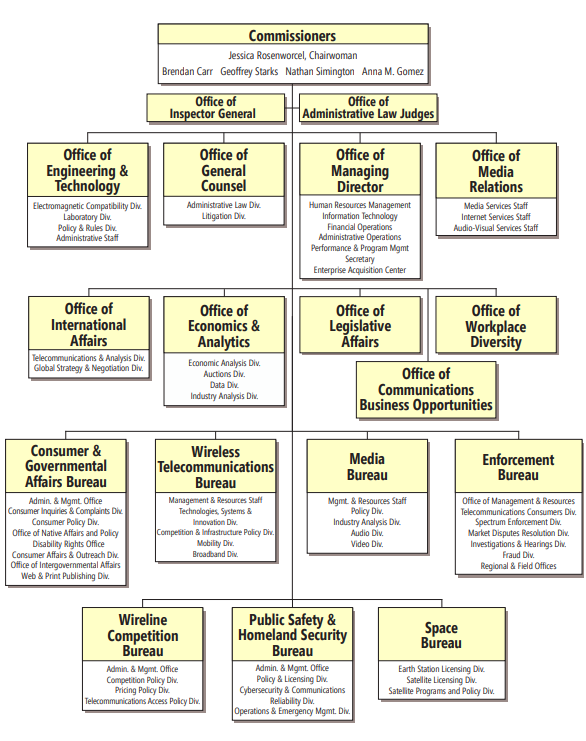About
About the FCC
OUR MISSION
The Federal Communications Commission regulates interstate and international communications by radio, television, wire, satellite, and cable in all 50 states, the District of Columbia and U.S. territories. An independent U.S. government agency overseen by Congress, the Commission is the federal agency responsible for implementing and enforcing America’s communications law and regulations.
WHAT WE DO
The FCC is an independent regulatory agency of the United States Government. The FCC is charged with regulating interstate and international communications by radio, television, wire, satellite, and cable. The Commission also regulates telecommunications, advanced communication services and video programming for people with disabilities, as set forth in various sections of the Communications Act.
To view the FCC’s strategic goals, please refer to the following link: https://www.fcc.gov/about/strategic-plans-budget
LEADERSHIP
The agency is directed by five commissioners who are appointed by the President of the United States and confirmed by the U.S. Senate. The president also selects one of the commissioners to serve as chairman or chairwoman. Only three commissioners can be of the same political party at any given time and none can have a financial interest in any commission-related business. All commissioners, including the chairman or chairwoman, have five-year terms, except when filling an unexpired term.
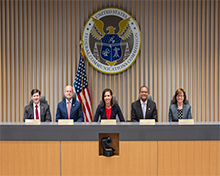 Commissioner Nathan Simington, Commissioner Brendan Carr, Chairwoman Jessica Rosenworcel, Commissioner Geoffrey Starks, and Commissioner Anna Gomez.
Commissioner Nathan Simington, Commissioner Brendan Carr, Chairwoman Jessica Rosenworcel, Commissioner Geoffrey Starks, and Commissioner Anna Gomez.FCC Leadership
ORGANIZATION
The commission is organized into bureaus and offices, based on function. Bureau and office staff members regularly share expertise to cooperatively fulfill responsibilities such as:
- Developing and implementing regulatory programs.
- Processing applications for licenses and other filings.
- Encouraging the development of innovative services.
- Conducting investigations and analyzing complaints.
- Public safety and homeland security.
- Consumer information and education.
Security
Office of Security
FCC ACCESS CONTROL BADGES
Employee Access Badge:
- Employees are initially issued a temporary badge during in-processing. Once a background investigation is complete an employee is approved to receive a permanent badge.
Contractor Access Badge:
- Contractors are initially issued temporary badges during in-processing. Once a background investigation is complete a contractor is approved to receive a Contractor Access Badge.

ACCESS BADGE VISIBILITY
- All FCC-issued Access Badges must be visible at all times, and must be worn in a manner that provides positive identification by security personnel.
- FCC Employees and Contractors are required to conceal and secure their badge when leaving the building (do not put the badge in the same case as Metro/Bus Card).

LOST OR MISUSE OF YOUR ACCESS BADGE
- The loss or misuse of an FCC-issued Access Badge is a serious security violation. Individuals should secure and account for their badge in the same in the same manner as their driver’s license or credit cards.
- A request for the re-issue of a lost badge, as well as an explanation on how the badge was lost, must be sent to the Security Operations Center (SOC) by the individual’s supervisor.

Payroll
Payroll
MENU:
Time and Attendance
- Work Requirement and Tour of Duty
- Fixed Work Schedules
- Compressed Work Schedules (CWS)
- Flexible Work Schedules
Federal Holidays & Direct Deposit
- Work requirement: For each full-time employee is eight hours per day, 40 hours per week, and 80 hours per pay bi-weekly pay period. The basic work week is five, eight hour workdays, Monday through Friday.
- Tour of Duty: An employee’s tour of duty will cover an 8-1/2 hour period, including a 30-minute lunch period and will begin between 7:00 am and 10:00 am and end between 3:30 pm and 6:30 pm.

- Traditional: Consistent start time and end time to complete the 8-1/2 hour tour of duty.
- Compressed Work Schedule (CWS): Although considered an Alternative Work Schedule (AWS), the CWS is actually a fixed work schedule that enables full-time employees to complete the basic 80-hour biweekly work requirement in fewer than ten workdays.
- 4-10 Schedule: Employee, with supervisory approval, works ten set hours four days a week.
- 5-4-9 Schedule: Employee, with supervisory approval, works nine set hours, five days a week, then nine set hours four days a week with a single day off.

- Traditional: Consistent start time and end time to complete the 8-1/2 hour tour of duty.
- Compressed Work Schedule (CWS): Although considered an Alternative Work Schedule (AWS), the CWS is actually a fixed work schedule that enables full-time employees to complete the basic 80-hour biweekly work requirement in fewer than ten workdays.
- 4-10 Schedule: Employee, with supervisory approval, works ten set hours four days a week.
- 5-4-9 Schedule: Employee, with supervisory approval, works nine set hours, five days a week, then nine set hours four days a week with a single day off.

- Traditional: Consistent start time and end time to complete the 8-1/2 hour tour of duty.
- Compressed Work Schedule (CWS): Although considered an Alternative Work Schedule (AWS), the CWS is actually a fixed work schedule that enables full-time employees to complete the basic 80-hour biweekly work requirement in fewer than ten workdays.
- 4-10 Schedule: Employee, with supervisory approval, works ten set hours four days a week.
- 5-4-9 Schedule: Employee, with supervisory approval, works nine set hours, five days a week, then nine set hours four days a week with a single day off.

Annual Leave
- New full time employees: Earn four hours of annual leave every two week pay period.
- Employees after three years of service: Earn six hours of annual leave every two week pay period.
- Employees after fifteen years of service: Earn eight hours of annual leave every two week pay period.
Sick Leave
- Full time employees earn four hours of sick leave every two week pay period.
- Annual leave is used for vacations, rest and relaxation, personal business, and emergencies.
- Annual leave requests will normally be approved provided that a reasonable and advanced notice has been given. However, an annual leave request my not be approved if the leave request is deemed to have a negative impact on workload and staffing requirements.

- Sick leave is used when an employee is unable to perform their duties by such reasons as sickness, injury, pregnancy, doctor or dentist appointments, and/or emotional bereavement.
- Employees will submit requests for sick leave to their supervisors.

- For the care of family members (child, spouse or parent), consult with your supervisor, administrative office and Human Resources to obtain authorization for leave granted under the Family Medical Leave Act (FMLA).

- Leave without pay (LWOP) is a temporary, non-pay status and absence from duty requested by the employee. Requests for LWOP can be taken in fifteen minute increments.
- Employees will submit requests for LWOP to their supervisors.

- Court Leave: An employee is entitled to paid-time-off, without being charged annual leave for services as a juror or witness. If the employee is excused from juror or witness duty, the employee must inform their supervisor immediately.
- Military Leave: Employees, who serve in the National Guard or in the Armed Forces Reserves, are entitled to paid-time-off for active or inactive duty service. Consult with your supervisor, administrative office and Human Resources.
- New Year’s Day (January 1)
- Martin Luther King, Jr. Day (Third Monday in January)
- Presidents’ Day (Third Monday in February)
- Memorial Day (Last Monday in May)
- Juneteenth National Independence Day (June 19)
- Independence Day (July 4)
- Labor Day (First Monday in September)
- Columbus Day (Second Monday in October)
- Veteran’s Day (November 11)
- Thanksgiving Day (Fourth Thursday in November)
- Christmas Day (December 25)
- Presidential Inauguration Day - Federal employees in Washington, DC area are entitled to a holiday on January 20 following a presidential election.
- Direct Deposit is used for salary deposits into an employee’s checking or savings account.
- In addition to direct deposit, you can have up to ninety-nine allotments. Allotments are recurring deductions from an employee’s salary to other bank accounts other than the direct deposit account.

Benefits
Benefits Overview
MENU:
Time and Attendance
- Federal Employee Health Benefits (FEHB)
- Federal Employee Group Life Insurance (FEGLI)
- Federal Employees Dental and Vision Program (FEDVIP)
- Federal Long-term Care Insurance (FLTCI)
- Federal Flexible Spending Account Program (FSA)
- Federal Employee Retirement System (FERS)
- Federal Transportation Subsidy Program

- The FEHB Program can help you and your family meet your health care needs. Federal employees, retirees and their survivors enjoy the widest selection of health plans in the country. You can choose from among Consumer-Driven and High Deductible plans that offer catastrophic risk protection with higher deductibles, health savings/reimbursable accounts and lower premiums, or Fee-for- Service (FFS) plans, and their Preferred Provider Organizations (PPO), or Health Maintenance Organizations (HMO) if you live (or sometimes if you work) within the area serviced by the plan.
- For more information contact Human Resources or visit: https://www.opm.gov/healthcare-insurance/healthcare/.
- The FEGLI Program offers the following group term-life insurance programs:
- Basic Life Insurance: Employees in eligible positions are automatically covered under Basic Life Insurance (coverage equal to your base salary), unless they choose to waive that coverage.
- Optional Insurance: Multiple options for employees to supplement their basic coverage. Employees must take action within a strict time limit to elect this option. Note: Coverage is not automatic.
- For more information contact Human Resources or visit: https://www.opm.gov/healthcare-insurance/life-insurance/.
- The Federal Employee Dental and Vision Benefits Enhancement Act of 2004 provided OPM the opportunity to establish arrangements under which supplemental dental and vision benefits are made available to federal employees, retirees, and their dependents.
- Dental and vision benefits are available to eligible federal and postal employees, retirees, and their eligible family members on an enrollee-pay-all basis. This program allows dental insurance and vision insurance to be purchased on a group basis, which means competitive premiums and no pre-existing condition limitations. Premiums for enrolled federal and postal employees are withheld from salary on a pre-tax basis.
- For more information contact Human Resources or visit: https://www.opm.gov/healthcare-insurance/dental-vision/.
- The Federal Long Term Care Insurance Program (FLTCIP) provides long term care insurance to help pay for costs of care when enrollees need help with activities they perform every day, or you have a severe cognitive impairment, such as Alzheimer’s disease.
- Most federal and postal service employees and annuitants, active and retired members of the uniformed services, and their qualified relatives are eligible to apply for insurance coverage under the FLTCIP.
- For more information contact Human Resources or visit: https://www.opm.gov/healthcare-insurance/long-term-care/.
- FSAFEDS allows you to save money for health care expenses with a Health Care or Limited Expense Health Care FSA. Think of it as a savings account that helps you pay for items that typically aren’t covered by your FEHB Plan, the Federal Employees Dental and Vision Insurance Program, or other health insurance coverage.
- FSAFEDS also offers an account for families with young children or elder care expenses – the Dependent Care FSA. This account allows you to set aside money to pay for your day care expenses.
- FERS is a retirement plan that provides benefits from three different sources: a Basic Benefit Plan, Social Security and the Thrift Savings Plan (TSP). Two of the three parts of FERS (Social Security and the TSP) can go with you to your next job if you leave the Federal Government before retirement.
- The Basic Benefit and Social Security parts of FERS require you to pay your share each pay period. The agency withholds the cost of the Basic Benefit and Social Security from your pay as payroll deductions. Your agency pays its part too. Then, after you retire, you receive annuity payments each month for the rest of your life.
- For more information contact Human Resources or visit: https://www.opm.gov/retirement-services/fers-information/.
- The Federal Transportation Subsidy Program is a financial incentive program designed to encourage employees to use mass transit for commuting to and from work. If you live in the Washington, D.C. metro area, you will be eligible to receive a transit pass download, e.g., TRANServe Debit Card, SmartTrip (R) or Metrochek, or a monthly or annual pass to cover these expenses. The maximum amount is up to $255.00 per month.
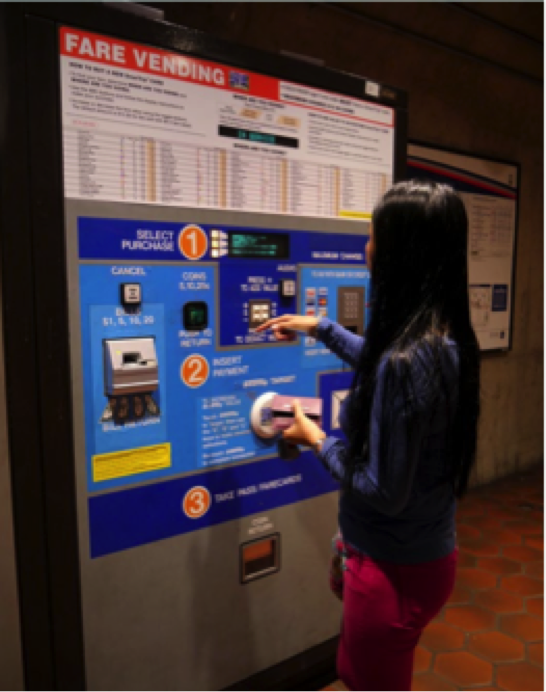
Training
Training & Development
FCC-University (FCCU) is a cutting-edge, learning and development center that delivers products and services in the following areas:
- Leadership and management training
- Employee development training
- E-learning course design and development
- Learning Management System (LMS) services
- Organizational Development services
- Coaching
- Group facilitation
- Team building events
- Strategic management
- Marketing and advertising services
- Performance support services
- All new employees are required to complete several online courses within their first 45 days. These courses will be assigned to you as part of the New Employee Orientation Learning Plan and will be automatically assigned to your account.
- FCC-University (FCCU) offers more than 50 instructor-led course offerings throughout the year. Look for email calendar and course announcements or check in FCCU for upcoming courses and workshops.
- FCCU provides an extensive online library of leadership and communication courses, as well as technical courses through its Skillsoft, Franklin Covey and Lynda.com curriculum.
- FCCU will support relevant and mission-related external training provided funding is available. External training is requested by completing an SF-182 (Government Request for External Training) via FCCU.
Ethics
ETHICS
- As an employee of the Executive Branch, you will be subject to a number of statutes and regulations governing your conduct that aim to protect the integrity of our agency’s programs and operations.
- Federal ethics rules are based on the following fourteen general principles of ethical conduct as adopted by the U.S. Office of Government Ethics.
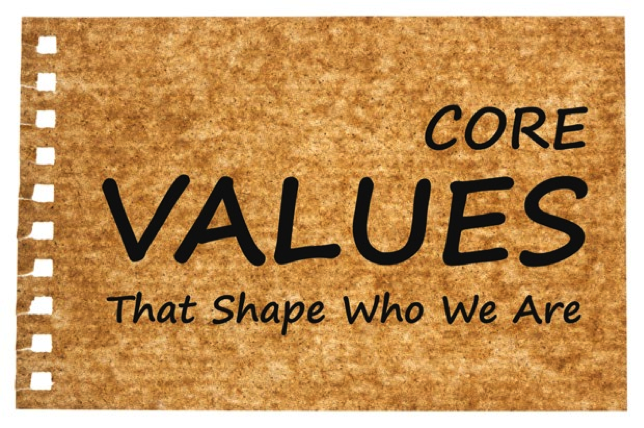
THE FOURTEEN GENERAL PRINCIPLES
- Public service is a public trust, requiring employees to place loyalty to the Constitution, the laws and ethical principles above private gain.
- Employees shall not hold financial interests that conflict with the conscientious performance of duty.
- Employees shall not engage in financial transactions using nonpublic Government information or allow the improper use of such information to further any private interest.
- An employee shall not, except as permitted by subpart B of this part, solicit or accept any gift or other item of monetary value from any person or entity seeking official action from, doing business with, or conducting activities regulated by the employee’s agency, or whose interests may be substantially affected by the performance or nonperformance of the employee’s duties.
- Employees shall put forth honest effort in the performance of their duties.
- Employees shall not knowingly make unauthorized commitments or promises of any kind purporting to bind the Government.
- Employees shall not use public office for private gain.
- Employees shall act impartially and not give preferential treatment to any private organization or individual.
- Employees shall protect and conserve Federal property and shall not use it for other than authorized activities.
- Employees shall not engage in outside employment or activities, including seeking or negotiating for employment, that conflict with official government duties and responsibilities.
- Employees shall disclose waste, fraud, abuse, and corruption to appropriate authorities.
- Employees shall satisfy in good faith their obligations as citizens, including all just financial obligations, especially those—such as Federal, State, or local taxes—that are imposed by law.
- Employees shall adhere to all laws and regulations that provide equal opportunity for all Americans regardless of race, color, religion, sex, national origin, age, or handicap.
- Employees shall endeavor to avoid any actions creating the appearance that they are violating the law or the ethical standards set forth in this part. Whether particular circumstances create an appearance that the law or these standards have been violated shall be determined from the perspective of a reasonable person with knowledge of the relevant facts.
Your First Day
Your First Day
IDENTIFICATION
As a condition of employment eligibility, you will be asked to complete the I-9 Employment Eligibility Verification form during orientation. To complete this form and verification process, you must bring official identification documents with you. When you report for Orientation, you have two options available:
- U.S. Passport, or
- U.S. State Photo Driver’s License or U.S. State Photo Identification Card, and one of the following:
- Original Social Security Card;
- Notarized Birth Certificate;
- U.S. Military Identification Card (Unexpired);
- U.S. Military Dependents Identification Card (Unexpired);
- U.S. State Voter Registration Card;
- U.S. College or University Student Identification Card (Unexpired).

* If you do not have a passport and do not meet the identification requirements listed in option-2, contact your Human Resources representative immediately.
FORMS
All of the appointment and payroll forms that you need to complete and bring with you on your first day are located in the hyperlinks below. If you have any questions, please contact Human Resources.
LIST OF FORMS
APPOINTMENT FORMS
To complete and sign the forms electronically, please download each form and open the file using Adobe Reader or Acrobat.
PAYROLL FORMS
To complete and sign the forms electronically, please download each form and open the file using Adobe Reader or Acrobat.
Employee's Maryland Withholding Exemption Certification
(MD Resident)Commonwealth of Virginia Personal Exemption Worksheet
(VA Resident)
BENEFITS FORMS
To complete and sign the forms electronically, please download each form and open the file using Adobe Reader or Acrobat.
The following benefit forms can be completed either in advance or after your orientation. For additional guidance and information, a benefits briefing will be held during your orientation. Note: If you are a Federal transfer, your benefits will transfer with you and you do not need to complete the benefit forms.
* Adding and updating one or more beneficiaries to your account is easy to do and only takes a few minutes online. Before you get started, be sure to have the Social Security number, full name, birth date, and address of each beneficiary. If your beneficiary is a trust, an estate, or another organization, you’ll need to know the trustee’s, executor’s, or business’s information.
PUBLIC TRANSPORTATION TO THE FCC
- The FCC is within walking distance from the Union Station metro stops. Check out https://www.wmata.com/ for travel times, costs, and other relevant information.
- The Virginia Rail Express (VRE) and the Maryland Rail Commuter (MARC) provide transportation into Washington, D.C. Check out https://www.vre.org/ and https://mta.maryland.gov/marc-train for travel times, costs, and other relevant information.

SPECIAL NEEDS & ACCOMMODATION
(1ST DAY OF EMPLOYMENT)
- FCC New Hires who need medical accommodation on the first day of employment should contact the Human Resources POC (identified in your offer letter), who will coordinate assistance for initial onboarding and orientation.

LUNCH OPTIONS
- The FCC new-hire orientation schedule includes a lunch break. Nearby and onsite lunch options are available.
- On most days, directly across from the FCC headquarters building on 45 L ST NE, numerous food-truck options are available.

PARKING OPTIONS
- There is an FCC garage located directly under the FCC Headquarters building. However, access to the FCC garage will require you to register with the FCC’s Administrative Support Center (ASC), and obtain a parking pass before being allowed to enter the garage. The parking pass is currently $151 a month.
- For temporary parking options, there are several parking garages located close to the FCC. Parking fees will range from $15-$35 day depending on how early you arrive in the morning.
OWD
Office of Workplace Diversity (OWD)
- OWD addresses diversity, equal employment opportunity (EEO), and affirmative employment matters. Specifically, OWD is charged with taking steps to foster a diverse workforce; with promoting and ensuring equal opportunity for all FCC employees and candidates for employment; and with developing the Commission’s affirmative employment goals and objectives.

Library
FCC Library
- The Federal Communications Commission Library serves to support and enrich the instructional and research needs of bureaus and offices within the agency. The Library pursues a full range of print and online materials that provide timely, accurate and efficient access to the sources of legal, legislative, business, economic and communications technology information that effectively supports agency staff research. Up-to-date core collections of telecommunications-related books, journals, and other documents and additional library services are provided to identify and obtain relevant information concerning FCC-related matters.
Find us at:
- TW-B505 ~ 8:00 a.m. – 5:30 p.m.
- Intranet » FCC Resources » e-Library and FCC Library
- Library@fcc.gov
- 202-418-0450
- Online Catalog: This Google-esque search engine allows you to see what is available from the FCC Library and libraries around the world. If the item that you are looking for is not available through the FCC Library, submit a request using the catalog or send a request to LIBRARY (Library@fcc.gov). Please note: interns cannot check out items from the Library, but their supervisors can check materials out for them.
- E-Resources: The Library links access points to several types of electronic resources: Library LibGuides (resource guides), dictionaries and manuals, FCC materials, electronic journals, newspapers, magazines and news wires.
- Training: Training sessions on a variety of our databases are held each month with the exceptions of April, August, November, and December. In addition you will be sent emails from FCCLibrary for upcoming training opportunities. If you would like to attend a training, or need assistance with any of our databases send your request to Suzanne.Mendez@fcc.gov or LIBRARY.
- Acquisitions: The Library maintains and provides access to FIRA: FCC Information Resource Acquisitions. FIRA is a catalog of databases, standards, journals, maintenance agreements, periodicals and magazines that have been acquired by the FCC.
- Databases: The Library provides access to many databases, listed in different categories.

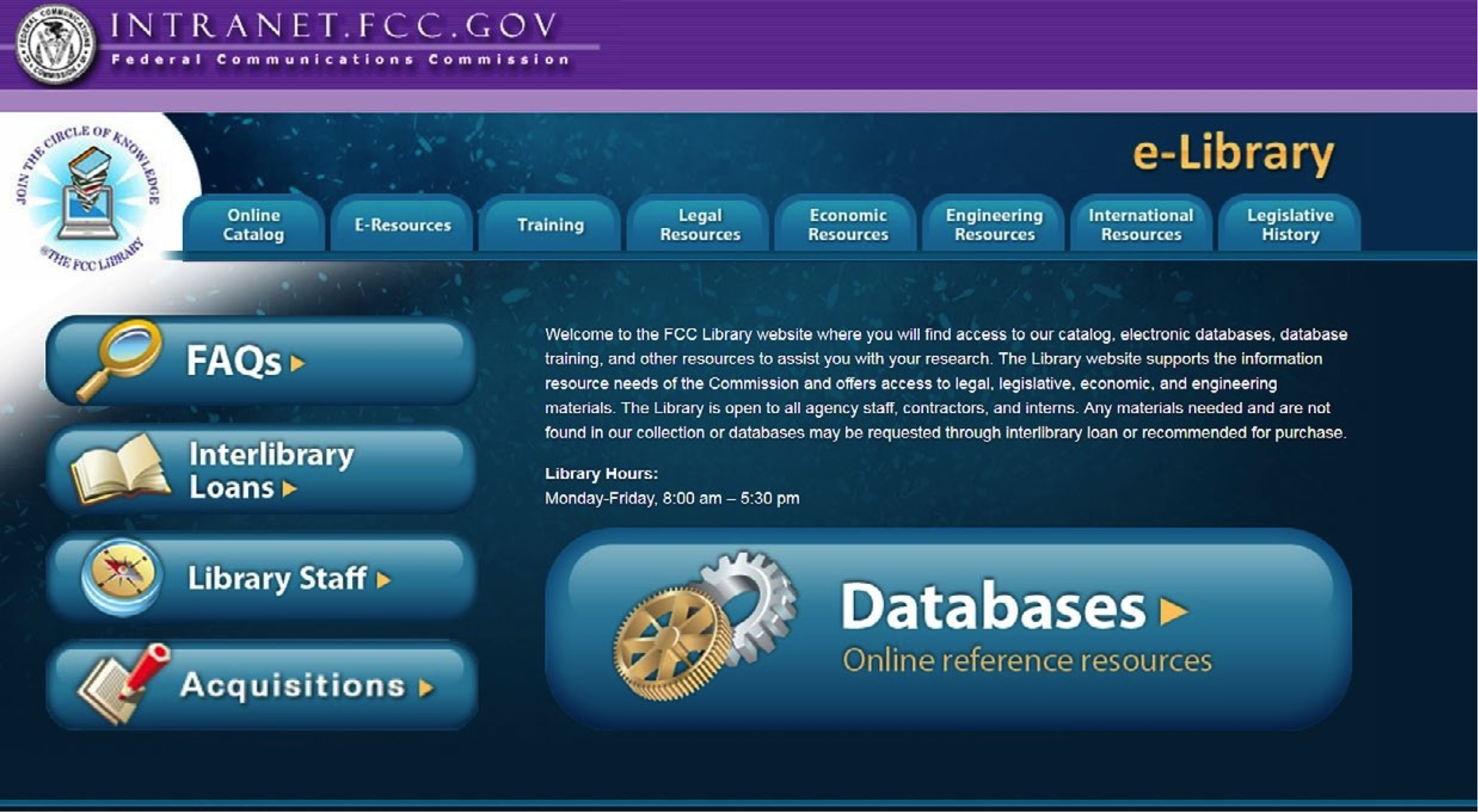
DATABASE CATEGORIES
Unrestricted Use — All databases listed as unrestricted are IP authenticated. As long as you are accessing these databases using an FCC connection either in headquarters or while teleworking using VDI, no password is required (or the password is listed for everyone).
- Unrestricted: Personal Profile Optional — You have the option of creating your own personal profile using your FCC issued email address.
- Unrestricted: Personal Profile Required — All FCC employees may access these databases; however, you will need to register yourself using your FCC issued email address to create your own username and password.
- Restricted: Contact Library Staff — All FCC employees may access these databases; however, you will need to contact LIBRARY at Library@fcc.gov for a username and password.
- Restricted: Library Use Only — FCC has a very limited number of spots available for these databases. Please send an email with your request to LIBRARY. If you have a business need for these databases and the information is not available in one of the Unrestricted or Personal Profile databases we will review your request and assign a spot based on availability.
CONTACT US
Contact your future supervisor, the point-of-contact listed in your offer letter, or humanresources@fcc.gov.
